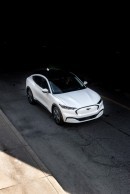We have been talking for years about the start of the electric revolution and still have not seen a concrete result. Sure, automakers are all talking about electrifying their model ranges and lowering their CO2 count – but they have been doing it compelled by legislation, not necessarily due to popular request. Now a recent study from IOP might have an insight into why U.S. buyers still do not buy lots of EVs.
2019 marked a drop in U.S. plug-in electric vehicle sales of 9% compared to the banner year of 2018 (when Tesla had lots of backlog orders and Model 3 buyers were still eligible for the full federal tax credit). Last year a total of almost 330,000 plug-in vehicles reached the market – as opposed to more than 361,000 in 2018.
More importantly, the 2019 figures tallied a low 2.2% market share. Not exactly great news for those thinking electric vehicles have surpassed their infancy and are prepared to take over the world. But, while there are reasons why Americans are not that much into buying electric cars, there is still hope – according to the new study.
The reality could change – though we imagine it will be an uphill battle until America reaches the level of Norway, for example, in terms of adoption rate. Still, companies such as Tesla and new models like the Ford Mustang Mach-E crossover really paint a clear picture of why the future belongs to electric-powered automobiles.
The IOP study elaborated on prior research that found a beneficial effect on increased consumer exposure to electric vehicles – mainly through direct experience. While other studies focused on long-term direct exposure, the new research wanted to see if noticeably short experiences bring a meaningful impact as well.
It turns out the main issue with EVs is that consumers do not have sufficient prior knowledge. For example, according to the experiment conducted during the 2019 Washington D.C. Auto Show, the respondents in their vast majority failed to respond correctly to basic questions – such as what is the price, how long does it take to recharge and what are the available federal tax credits.
While most people failed this basic quizz test, many of them became a lot more positive after just a quick five-minute ride inside an EV to prove that some of their misconceptions can be addressed easily. One might assume that such a quick fix is not the universal solution. Rather, the potential remedies could include an extended model catalogue (this is what happens in China, for example) and increased affordability.
The study even noted the Tesla Model 3 success as being abnormal for a model that is more expensive than competing ICE (internal combustion engine) cars. Perhaps that rumored compact electric that Tesla could introduce after the Cybertruck might hit the pricing sweet spot...
More importantly, the 2019 figures tallied a low 2.2% market share. Not exactly great news for those thinking electric vehicles have surpassed their infancy and are prepared to take over the world. But, while there are reasons why Americans are not that much into buying electric cars, there is still hope – according to the new study.
The reality could change – though we imagine it will be an uphill battle until America reaches the level of Norway, for example, in terms of adoption rate. Still, companies such as Tesla and new models like the Ford Mustang Mach-E crossover really paint a clear picture of why the future belongs to electric-powered automobiles.
The IOP study elaborated on prior research that found a beneficial effect on increased consumer exposure to electric vehicles – mainly through direct experience. While other studies focused on long-term direct exposure, the new research wanted to see if noticeably short experiences bring a meaningful impact as well.
It turns out the main issue with EVs is that consumers do not have sufficient prior knowledge. For example, according to the experiment conducted during the 2019 Washington D.C. Auto Show, the respondents in their vast majority failed to respond correctly to basic questions – such as what is the price, how long does it take to recharge and what are the available federal tax credits.
While most people failed this basic quizz test, many of them became a lot more positive after just a quick five-minute ride inside an EV to prove that some of their misconceptions can be addressed easily. One might assume that such a quick fix is not the universal solution. Rather, the potential remedies could include an extended model catalogue (this is what happens in China, for example) and increased affordability.
The study even noted the Tesla Model 3 success as being abnormal for a model that is more expensive than competing ICE (internal combustion engine) cars. Perhaps that rumored compact electric that Tesla could introduce after the Cybertruck might hit the pricing sweet spot...












